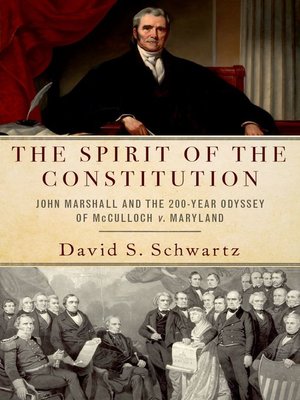The Spirit of the Constitution
ebook ∣ John Marshall and the 200-Year Odyssey of McCulloch v. Maryland
By David S. Schwartz

Sign up to save your library
With an OverDrive account, you can save your favorite libraries for at-a-glance information about availability. Find out more about OverDrive accounts.
Find this title in Libby, the library reading app by OverDrive.



Search for a digital library with this title
Title found at these libraries:
| Loading... |
2019 marks the 200th anniversary of one of the most important Supreme Court decisions in American history: McCulloch v. Maryland. The state of Maryland tried to impede the establishment of the Bank of the United States, but Chief Justice John Marshall decided that the Necessary and Proper clause of the Constitution gave the federal government implied powers that allowed it to charter the bank without hindrance. The decision expanded the power of the national government vis-à-vis the states, and it still figures centrally in contemporary debates about the scope of national legislative power. Indeed, Chief Justice Roberts' 2012 decision upholding the Affordable Care Act relied on it. In The Spirit of the Constitution, David S. Schwartz tells the story of the decision's long-term impact and the evolution of Justice Marshall's reputation. By tracing the rich history of McCulloch's influence from 1819 to the present, he shows that its meaning-and significance-for judges, political leaders, and the public varied greatly over time. The case was alternately celebrated, denounced, ignored, and reinterpreted to suit the needs of the moment. While Marshall was never reviled, he was not seen as especially influential until the late nineteenth century. Competing parties utilized McCulloch in constitutional debates over national power in the early republic; over the question of slavery in the late antebellum period; and over Congress's role in regulating the economy and civil rights in the twentieth century. Even after McCulloch's meaning seemed fixed by the mid-twentieth century, new debates about its implications have emerged in recent times. Schwartz's analysis of McCulloch's remarkable impact reaffirms the case's importance and unveils the circuitous process through which American constitutional law and ideology are made.






